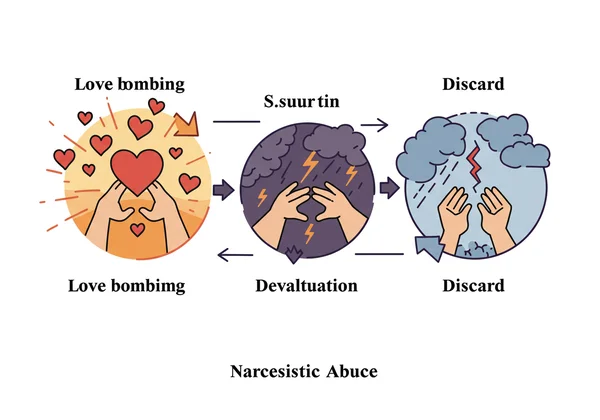NPD Test: Guide to Dealing with a Narcissist & Toxic Relationships
September 29, 2025 | By Clara Jennings
Navigating a relationship with someone exhibiting narcissistic traits often feels like walking on eggshells – isolating, confusing, and utterly draining. If you're struggling with a narcissist's impact, remember: you're not alone. There are paths to protect your well-being and regain clarity. The journey starts with understanding the complex dynamics at play. If you're asking, "How do I tell if my partner has NPD traits?", this guide will offer insights and actionable strategies to help you manage these difficult interactions. For those seeking an immediate starting point, an initial screening can provide valuable perspective. You can explore these traits with a confidential online tool.

Understanding Narcissism in Your Relationships
Before you can effectively manage a relationship with a person who may have narcissistic traits, it's crucial to understand what you're facing. Narcissism exists on a spectrum, but when these traits are pervasive and cause significant impairment, they can create profoundly toxic environments. This understanding is not about diagnosing someone—a task reserved for professionals—but about recognizing patterns to protect yourself.
What Defines a Narcissist? Core Traits to Recognize
At its core, Narcissistic Personality Disorder (NPD), as outlined in the DSM-5, is characterized by a persistent pattern of grandiosity, a constant need for admiration, and a profound lack of empathy. Key signs of NPD to watch for include an inflated sense of self-importance, a preoccupation with fantasies of unlimited success or power, a belief that they are "special," and a tendency to exploit others to achieve their own ends. They often struggle to recognize or identify with the feelings and needs of others.
Why Narcissistic Relationships Can Be So Destructive
The narcissistic abuse cycle is what makes these relationships so damaging. It often begins with an intense "love bombing" phase, where you feel adored and cherished. This is followed by a devaluation phase, where criticism, contempt, and emotional manipulation become the norm. Finally, there's the "discard" phase, where the individual may abruptly end the relationship, only to potentially reappear later to restart the cycle. This devastating pattern erodes your self-esteem and forges a trauma bond that can feel impossible to break.

Common Misconceptions About Narcissism
One of the most common myths about narcissists is that they are all loud, overtly arrogant, and boastful. While this describes the grandiose or overt narcissist, there is also the vulnerable or covert type. These individuals can appear shy, insecure, or victimized, but they still possess the same core traits of entitlement and lack of empathy, expressing their grandiosity in more passive-aggressive ways. Understanding this distinction is vital for recognizing the behavior accurately.
Universal Strategies for Dealing with a Narcissist
Whether you're interacting with a partner, parent, or colleague, certain universal strategies can help you protect your mental and emotional health. These techniques are centered on creating distance and reinforcing your sense of self.
Setting and Maintaining Firm Boundaries
For your own well-being, establishing boundaries with narcissists is non-negotiable. Boundaries are the limits you set on what you will and will not tolerate. Be clear, concise, and firm. For example, say, "I will not continue this conversation if you raise your voice," and then follow through by walking away if they do. Expect pushback, as individuals with narcissistic traits despise being told "no," but consistency is key to making boundaries stick.

The "Grey Rock" Method: Disengaging Effectively
The grey rock technique is a powerful tool for disengagement. It involves making yourself as uninteresting as a grey rock. When you communicate, be factual, brief, and unemotional. Avoid sharing personal information or reacting to provocations. Individuals with narcissistic traits thrive on emotional reactions—positive or negative—so by not providing that "narcissistic supply," you make yourself a less appealing target.
Protecting Your Emotional & Mental Well-being
Your survival and recovery in these draining relationships depend on fiercely prioritizing self-care. This means actively engaging in activities that replenish your spirit, connecting with a supportive network of friends or family who validate your experiences, and practicing mindfulness to stay grounded in your own reality. It's about consciously rebuilding the self-esteem that the toxic dynamic has tried to dismantle.
Recognizing and Responding to Manipulation Tactics
Arm yourself with knowledge about common narcissistic manipulation tactics. Gaslighting makes you question your sanity, projection accuses you of their own negative behaviors, and word salad uses confusing language to derail arguments. When you can name the tactic, it loses its power. Respond not by arguing the point, but by stating your reality calmly: "I know what I saw," or "We seem to remember that differently."
Navigating Specific Narcissistic Relationships
While the core strategies are universal, their application can differ depending on the nature of the relationship. The power dynamics and emotional ties in each context require a tailored approach.
Strategies for a Narcissistic Partner or Spouse
When your partner exhibits these traits, the emotional toll is immense. Effective narcissistic partner strategies involve seeking couples counseling (with a therapist experienced in NPD), creating a strong support system outside the relationship, and realistically evaluating the future. Documenting incidents can help you stay grounded in reality. For many, the safest path forward is planning a careful exit. Gaining clarity on the situation is a critical first step; a free NPD test can offer a structured way to review behaviors.
Coping with a Narcissistic Parent or Family Member
Dealing with a narcissistic parent involves navigating complex feelings of guilt, obligation, and love. The key is to move from a child's role to an adult's. This may mean limiting contact, refusing to engage in drama, and grieving the parent you wish you had. Remember, you cannot change them, but you can change how you respond to them. Setting firm boundaries is especially crucial in these life-long dynamics.
Managing a Narcissistic Boss or Colleague in the Workplace
A narcissistic boss can create a toxic work environment where credit is stolen, blame is shifted, and manipulation is rampant. To survive, keep communication in writing whenever possible to create a paper trail. Focus on your performance, build alliances with other colleagues, and avoid sharing personal vulnerabilities. Keep your interactions professional and focused on tasks, and if the environment becomes unbearable, begin planning a transition to a healthier workplace.
When to Seek Professional Help and Next Steps
Recognizing narcissistic patterns is the first step, but taking action is what leads to healing and change. Sometimes, this requires support beyond what you can do on your own.
Recognizing When a Relationship is Unsafe or Beyond Repair
Your safety must always come first. If you are experiencing physical, verbal, or severe emotional abuse, it is time to seek immediate help. A crucial part of ending a narcissistic relationship is recognizing that you cannot fix the other person. If they show no willingness to acknowledge their behavior or seek professional help, the relationship is unlikely to become healthy.
Exploring Support Systems: Therapy & Support Groups
Finding support for narcissistic abuse victims is a vital part of recovery. A therapist specializing in personality disorders or trauma can provide you with tools to heal and rebuild your self-worth. Support groups, whether online or in-person, connect you with others who understand your experience, which can be incredibly validating and empowering.

Gain Clarity: Take Our Free NPD Test
If you're still questioning the patterns you see in yourself or someone else, an objective tool can help provide clarity. While not a diagnosis, our free NPD test is based on DSM-5-TR criteria to help you identify key traits. Taking a few moments to start your self-discovery can be an empowering first step toward understanding and making informed decisions about your relationships and well-being. It is completely confidential and provides instant results.
Reclaiming Your Power: Moving Forward from Narcissistic Relationships
Dealing with narcissistic behavior is a marathon, not a sprint. It requires patience, strength, and a deep commitment to your own well-being. By understanding the dynamics, setting firm boundaries, and building a strong support system, you can move from a position of confusion and pain to one of empowerment and clarity. The journey begins with a single step toward understanding. We encourage you to get initial insights and continue exploring the resources that can help you heal and thrive.
FAQ Section: Frequently Asked Questions About Narcissistic Relationships
How do I tell if my partner has NPD traits?
Look for a consistent pattern of behavior that includes a grandiose sense of self-importance, a constant need for admiration, a lack of empathy, manipulative tendencies, and a sense of entitlement. They may react with rage to criticism and exploit others without guilt. For a more structured look at these behaviors, a confidential NPD screening tool can help you organize your observations.
What makes a narcissist angry or react negatively?
Individuals with strong narcissistic traits often react with intense anger, known as "narcissistic rage," when they feel criticized, rejected, or challenged. This can be triggered by something as simple as disagreeing with them, not giving them enough attention, or holding them accountable for their actions. Their fragile self-esteem cannot handle perceived slights.
What happens when you ignore a narcissist?
Ignoring a person with narcissistic traits, or using the "grey rock" method, cuts off their narcissistic supply. Their reaction can vary. Some may escalate their behavior to provoke a response, becoming more manipulative or aggressive. Others may lose interest and discard you, seeking validation elsewhere. The outcome depends on the individual and the dynamics of your specific relationship.
Do narcissists know they are narcissistic?
This is complex. Many individuals with NPD lack the self-awareness to see their behavior as problematic. They often believe their view of the world is the only correct one and that others are the problem. Some may have moments of insight or be aware they are different, but they rarely grasp the full extent of how their actions impact others. This lack of insight is a primary barrier to seeking help or changing.